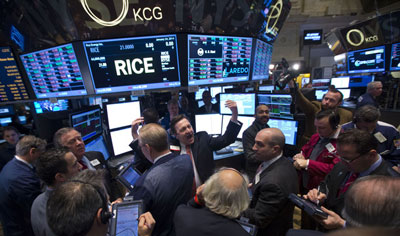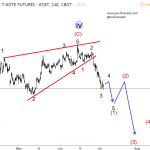Don’t Shortchange Short Sellers

More finance journalists and industry people should go to academic conferences. There is a lot of good stuff to learn. Case in point: I recently attended the Western Finance Association’s annual meeting in Monterey, California, and saw several papers that changed my outlook on financial markets and policy. One of the most interesting was called “Short Selling Risk,” by Matthew Ringgenberg, Adam Reed, and Joseph Engelberg.
But first let’s back up and talk about a little history. Why should financial markets have bubbles, where asset prices soar above fundamental values? Eugene Fama and Milton Friedman thought that “arbitrageurs” — rational investors — would see the discrepancy and short-sell the asset in question until the price went back down to reasonable levels. But in the 1990s, economists such as Andrei Shleifer and Robert Vishny started arguing that no, this wasn’t always possible. Unlike going long, going short has extra costs. If going short is too hard, then arbitrage is limited; the optimistic investors will push prices up, and the pessimistic investors won’t be able to counteract them. Voila: bubbles.
What Ringgenberg and his co-authors do is to look at how short-selling actually works in real life — in which an investor borrows shares and sells them, hoping to buy them back after a price decline — and figure out what the costs of shorting really are. They find that there are two big costs that have been largely ignored. The first is the risk of high fees. Usually, dealers charge only a very small fee when they lend out shares of stock to short-sellers. But occasionally, these fees can shoot up to astronomical levels, before the short position is closed. That creates a huge risk for a short-seller.
Second, dealers generally have the ability to recall a stock loan at any time. If you’re a short-seller, and you think the price is going to crash in two years, you may have to return your borrowed shares in only one year, before the crash. This means you might lose money even though you were right. That’s another big risk, and it happens about 2 percent of the time.
So in the equity market, shorts face huge disincentives, and longs don’t. That means over-optimistic longs get to set the price. Actually, it’s worse — people will buy stocks in the expectation of reselling them to even more over-optimistic longs in the future! Suddenly, speculation goes from a buzzword to a very real phenomenon.
There has been a lot of controversy over short-selling. People are afraid that shorts can foment panic, driving down stock prices by making it look as if there has been a piece of bad news, then buying at the dip and earning a double profit when the artificial panic fades. Fomenting is illegal, of course, but it’s pretty hard to catch, much less prove. Others worry that shorts make market crashes worse. Those suspicions were behind the experiments with short-selling bans in the U.S. and Europe following the 2008 financial crisis.
On the other hand, plenty of finance professors view shorts as society’s best hope of killing asset bubbles before they get too big. If the profs are right, then short-selling costs should reduce a stock’s returns. And guess what — Ringgenberg et al. find exactly that. Stocks for which shorting costs are higher experience less short selling, and have lower returns going forward. Other profs have found that short-selling risks tend to increase the time it takes stocks to incorporate new information into the price — in other words, shorts help markets to be more efficient.
So what can we do to enable short-sellers to do their job? Avoiding bans on shorting is obviously the first thing to do, but Ringgenberg et al. show that this won’t be enough, because the stock lending market itself isn’t set up well. One solution might be centralized exchanges for lending stock shares. That would cut into the profits of dealers, but it would vastly increase the ability of shorts to borrow. (This solution was suggested to me by James Angel, a Georgetown finance professor who often advises the U.S. government regarding financial regulation and transparency.)
Everyone wants stocks to go up — a higher stock market, after all, means a wealthier country. Shorts seem bad because they profit from stocks going down. But if shorts are bad, then so are risk managers. If shorts are bad, then so is anyone who shoots down an idea in a board meeting. Shorts are the leash that markets put on asset bubbles. We should be helping them do their job.
Noah Smith is an assistant professor of finance at Stony Brook University and a freelance writer for a number of finance and business publications. He maintains a personal blog, called Noahpinion.
Source: bloomberg





























